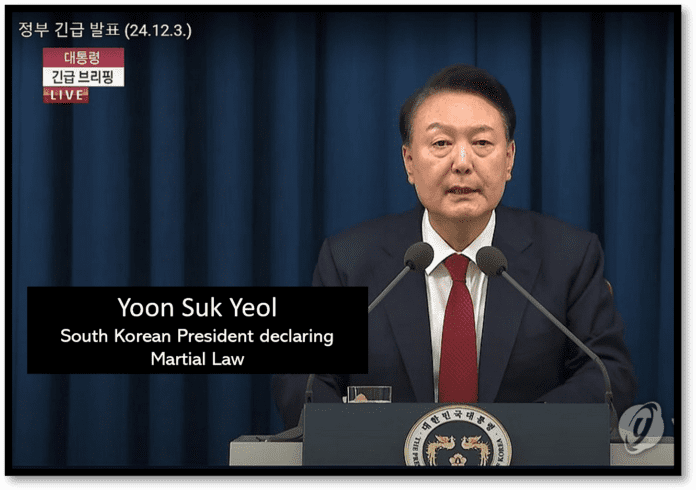In a shocking turn of events, South Korean President Yoon Suk Yeol declared emergency martial law on Tuesday, December 3, 2024, citing threats to national security and accusing the opposition of anti-state activities. South Korea’s security forces entered the building of the National Assembly in Seoul. Tanks have taken to the streets. In a reaction, South Korea’s parliament votes 190-0 to lift martial law.
Background and Declaration
President Yoon made the announcement during a televised address to the nation, stating that the measure was necessary to “safeguard a liberal South Korea from the threats posed by North Korea’s communist forces and to eliminate anti-state elements.” The declaration comes amid ongoing political deadlock between Yoon’s conservative People Power Party and the opposition Democratic Party, which controls the majority in the National Assembly.
Reasons Cited
President Yoon accused the opposition of several serious offenses:
- Controlling the parliament
- Sympathizing with North Korea
- Paralyzing the government with anti-state activities
- Cutting key budgets essential to national security and public safety
He also criticized the opposition for attempting to impeach top prosecutors and rejecting the government’s budget proposal5.
Potential Impacts
The declaration of martial law could have far-reaching consequences for South Korea:
- Governance: The exact measures to be implemented under martial law remain unclear, creating uncertainty about how the country will be governed in the immediate future.
- Democratic Processes: There are concerns about the potential impact on South Korea’s democratic institutions and processes.
- Political Tensions: The move is likely to exacerbate existing political divisions and could lead to further instability.
- International Relations: The declaration may affect South Korea’s relationships with its allies and neighbors, particularly given the accusations of pro-North Korean sympathies within the opposition.
Reactions
Domestic Reactions
- Democratic Party: The main opposition party called an emergency meeting of its lawmakers following Yoon’s announcement.
- People Power Party: Surprisingly, the leader of Yoon’s own party, Han Dong-hoon, opposed the move, stating, “The president’s martial law declaration is wrong. We will stop it along with the people.”
- Lee Jae-myung: The Democratic Party opposition leader described the declaration as “illegal and unconstitutional.” He declared a coup, stating “Yoon Suk Yeol is no longer the president of South Korea.
International Reactions
As of the latest updates, specific reactions from international leaders, including U.S. President Biden and former President Trump, have not been reported. However, given the significance of this development, it is likely that:
- The U.S. government will closely monitor the situation, given its strategic alliance with South Korea.
- Other regional powers, such as Japan and China, may express concern over the potential instability in the Korean Peninsula.
- International organizations like the United Nations may call for a peaceful resolution and the preservation of democratic norms.
This situation is still unfolding, and further developments are expected as the international community responds to this unprecedented move in modern South Korean politics.





